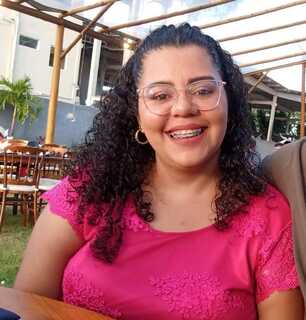We love building relationships. Subscribe to our blog to receive weekly encouragement in your email inbox.
Visit Our Store
Donate
You can also mail checks, made out to IRSM, to:
Iron Rose Sister Ministries
PO Box 1351
Searcy, AR 72145
IRSM is a 501(c)(3), so donations are tax-deductible.
Blog
More blog entries below
 Written by Amanda Santos, volunteer with Iron Rose Sister Ministries in João Pessoa, Brazil
Written by Amanda Santos, volunteer with Iron Rose Sister Ministries in João Pessoa, Brazil
“Leave everything you have and follow me” is a simple order to understand, but when we read Mark 10:21-22 we see how sad that young man was because he thought about what was included in his “everything” that he would have to leave behind.
Bringing this example to our lives, what is our “everything”? What do we have that is so valuable that sometimes keeps us from leaving it and following Christ? Well, maybe your “everything” is the concern with household chores, or perhaps the desire to acquire a material possession, or you need to handle just one more little thing before leaving everything in God’s hands. That young man really wanted to follow Christ, but his material possessions took up so much space in his heart that he was unable to leave everything and trust in Jesus.
In Luke 9:23 we read the following: “Then he said to them all: “Whoever wants to be my disciple must deny themselves and take up their cross daily and follow me’” (NIV).
When Jesus says, “deny yourself,” He is calling us to set aside our selfish desires and put God’s will first. Denying ourselves is an expression of humility and submission. It is recognizing that our own plans and desires are secondary to God’s plans. This call to self-denial is an invitation to live a life of sacrifice and obedience, where God’s will prevails over our personal inclinations.
The second part of the verse calls us to take up our cross daily. The cross, in Jesus’ day, was a symbol of death and suffering, but it has become a powerful symbol of redemption and sacrificial love. Taking up our cross means being willing to suffer and face hardships for the sake of Christ. Taking up our cross daily involves living a life of spiritual discipline, rejecting sin and pursuing holiness. It means accepting the challenges and adversities that arise in our Christian walk with the same willingness and courage that Jesus had in carrying His cross. It is a call to a life of dedication and unwavering commitment to Christ.
And finally, “follow Jesus” means imitating His example, living according to His teachings, and walking in the path He shows us. Following Jesus is a call to live in obedience and faithfulness. It is allowing Him to guide our lives and transform our hearts.
Imitating Jesus involves deeply knowing His teachings and applying these principles in our daily lives. This requires an ongoing commitment to studying the Bible, praying, and seeking fellowship with other believers. It is through this dedication that we can better understand God’s will and align our lives with His purposes.
In Matthew 4:19, Jesus says, “Follow me, and I will make you fishers of men” (KJV). This phrase from Jesus is calling men to be His disciples, and as disciples of Jesus, to spread His word. It is a call to evangelize and spread the good news of salvation throughout the world. And something I think is wonderful is that we can do this without even having to leave home. When you talk about Jesus to your family, you are evangelizing. And don’t worry — Jesus said, “I will make you.” The knowledge comes from Him, the words come from Him. We just need to be surrendered to His will and ready to do what we can.
Therefore, sisters, may we be willing to give up all control and our own desires to let Christ guide us on the best path. And may our lives be an example of faith, that through our relinquishment and surrender, Christ may be exalted.
 Written by Liliana Henríquez, volunteer for Iron Rose Sisters Ministries in Colombia
Written by Liliana Henríquez, volunteer for Iron Rose Sisters Ministries in Colombia
One of the most challenging tasks for a human being is to let go of egocentrism and adopt a position of total surrender to God. We mistakenly believe we are all-powerful, but the truth is that nothing moves without God’s will.
When we look at the life of Jesus, we see that He was obedient in everything, even though, humanly speaking, He faced the unimaginable pain of crucifixion. Who would willingly offer himself to endure such intense physical suffering as dying on a cross? Jesus did! And because of this, you and I don’t have to pay for our sins—we have eternal life. In the pivotal moment of His death, Jesus fully surrendered to God and His will, saying, “Father, into Your hands I commit My spirit” (Lk 23:46, NIV).
In our daily lives, we must “crucify ourselves” repeatedly, or in other words, set aside our own desires and make sacrifices for a higher good.
We set aside our desires to prioritize those of our partner...
We set aside our rest to choose to play with our children...
We set aside our comfort to serve others with love...
We set aside what we want and focus on fulfilling God’s calling for our lives.
In the spiritual realm, things operate under the principle of total surrender to God. Those of us who have accepted Christ as Lord understand that we no longer live to satisfy our own desires, but to fulfill Christ’s (Gal 2:20). We know that those who want to be exalted must humble themselves. Those who want to be served must serve. Those who want to be loved must love. Those who want to receive must give.
This doesn’t mean we always agree with God’s plans. Often, we don’t. In fact, many times, we feel upset because we don’t understand why He asks us to do things that seem “illogical” or outside our comfort zone. However, a true servant of God surrenders because she knows WHOM she is serving and follows the example of Jesus on the cross saying, “Father, if you are willing, take this cup from me; yet not my will, but yours be done” (Lk 22:42).
A true servant does her part with a surrendered heart and in complete obedience to God—and lets God be God. We don’t need to understand everything God does, but we do need to do everything He calls us to because that’s the commitment we made when we decided to be His disciples.
Is your life fully surrendered to the will of God?

